No products in the cart.

For years, managers have been giving performance reviews to the people they supervise.
The idea behind them is sound – to review what employees have been doing, set new goals, and schedule a time to meet again to review the progress they have made.
My issue is that the structure of job reviews has led employees to view them this way . . .
“I am going to have to admit things that I have not done well, and my supervisor will correct and blame me.”
That expectation has caused employees to dislike, or even dread, job reviews. Many of them think the best way to survive one is to hide or misrepresent problems, which obviously will not help them or the organization attack the right issues in the right way.
The solution, in my experience, is to replace classic performance reviews with frequent check-in meetings between managers and the staff members they supervise. These check-ins should be held about once a month, or more frequently during times when a lot of critical work is being done.
Structuring Your Check-In Meetings
It is important to frame the check-in discussions in positive and motivational ways that drain the blame from the entire manager/employee discussion. Here are some suggestions that can make that critical change happen.
Start by asking, “What have you done since we last met that you have felt especially good about?”
This question encourages the employee to discuss things that have gone right, not wrong. And it sets a positive tone for the entire discussion.
Follow up by asking, “Is there a way the organization can support you better in this area?”
Perhaps the employee needs a temporary worker to do administrative work, a piece of technology or some other resource that will make the work more efficient. When you ask this question, you show that you are there to offer encouragement and support, not blame.
Use what I call the “Five to One” Rule
This means that as a manager, you should make five positive statements for every one that could potentially be viewed as negative criticism. One example of those five positives could be, “I would like to compliment you on the way you have motivated people on your team to complete the recent customer survey.” One statement that could be viewed as criticism could be, “Why did it take six weeks to gather and summarize the results of our survey?” Note that both questions will lead to an operational discussion about a survey, but the second one will reveal the same information in a positive and proactive way.
Finish the Discussion with Yet More Positive Motivation
A process-centered question like, “When should we follow up to discuss what you and your team have gotten done on this?” can be followed with a positive statement like, “You are doing just a great job on the projects and processes we have talked about today. Great job!”
When the employee leaves a meeting with a positive statement like that still ringing in her or his ears, there will be positive motivation to perform.
Resist the Temptation to File a Detailed Report in the Employee’s Personnel File
Yes, it is a good idea to document what was discussed. But you can note the topics and goals that were set in a short memo that you keep on file.
One thing for certain? Handing the employee a memo that itemizes everything you discussed – and requiring that he or she sign it before it is placed in a folder in your HR department – is not a way to motivate employees or make them feel energized to do great work.
In Summary . . .
If your company’s policies require you to do annual or semi-annual job reviews with every employee, you need to go ahead and do them. But you can also hold frequent check-in meetings like the ones we have discussed in this article.
If you try it, I know you will achieve remarkable improvements in your leadership and your team’s progress.
About Evan Hackel, C-Suite Advisor
As author, speaker, and consultant, Evan Hackel has been instrumental in launching more than 20 businesses and has managed a portfolio of brands with system-wide sales of more than $5 billion. He is the creator of Ingaged Leadership, is author of the book Ingaging Leadership Meets the Younger Generation and is a thought leader in the fields of leadership and success.
Evan is the CEO of Ingage Consulting, Delta Payment Systems, and an advisor to The Learning Network (formerly Tortal Training). Reach Evan at ehackel@ingage.net, 781-820 7609 or visit www.evanhackelspeaks.com












